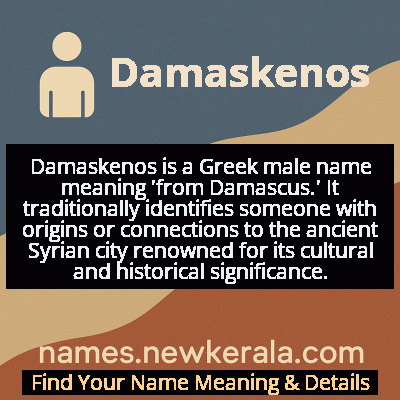Damaskenos Name Meaning & Details
Origin, Popularity, Numerology Analysis & Name Meaning of Damaskenos
Discover the origin, meaning, and cultural significance of the name DAMASKENOS. Delve into its historical roots and explore the lasting impact it has had on communities and traditions.
Name
Damaskenos
Gender
Male
Origin
Greek
Lucky Number
3
Meaning of the Name - Damaskenos
Damaskenos is a Greek male name meaning 'from Damascus.' It traditionally identifies someone with origins or connections to the ancient Syrian city renowned for its cultural and historical significance.
Damaskenos - Complete Numerology Analysis
Your Numerology Number
Based on Pythagorean Numerology System
Ruling Planet
Jupiter
Positive Nature
Optimistic, inspirational, and creative.
Negative Traits
Scattered, exaggerating.
Lucky Colours
Yellow, gold, purple.
Lucky Days
Thursday.
Lucky Stones
Yellow sapphire.
Harmony Numbers
1, 2, 9.
Best Suited Professions
Arts, writing, communication.
What People Like About You
Creativity, optimism.
Famous People Named Damaskenos
Saint John of Damascus
Christian monk and priest
Doctor of the Church, defender of icons, influential theologian and hymnographer
Nicholas Damaskenos
Historian and philosopher
Court historian for Herod the Great, wrote universal history and biographies
Michael Damaskenos
Painter
Leading Cretan School icon painter, blended Byzantine and Italian Renaissance styles
Damaskenos the Studite
Monk and writer
Author of spiritual works and defender of Orthodox monastic traditions
Name Variations & International Equivalents
Click on blue names to explore their detailed meanings. Gray names with will be available soon.
Cultural & Historical Significance
Throughout Byzantine and post-Byzantine history, the name continued to be borne by significant cultural figures, including historians like Nicholas Damaskenos, who served in Herod's court, and artists like Michael Damaskenos of the Cretan School, whose work blended Byzantine and Italian Renaissance styles. The name symbolizes the cultural exchange between Greece and the Levant, reflecting Damascus's role as a crossroads of civilizations. In modern Greek culture, Damaskenos maintains its association with tradition, scholarship, and the preservation of Orthodox Christian heritage, serving as a living connection to both classical learning and early Christian history.
Extended Personality Analysis
Individuals bearing the name Damaskenos are typically associated with intellectual depth, spiritual awareness, and cultural sophistication. They often exhibit a natural inclination toward learning and contemplation, reflecting the name's connection to ancient centers of wisdom like Damascus. These individuals tend to be patient, methodical thinkers who value tradition while remaining open to new ideas—much like the historical city that absorbed influences from multiple civilizations while maintaining its distinct character. Their personality often combines the resilience of Damascus steel with the refined artistry of damascene craftsmanship.
In social contexts, Damaskenos-named individuals frequently display diplomatic skills and cultural sensitivity, able to navigate diverse perspectives and bridge different communities. They often possess strong ethical convictions and a sense of historical continuity, seeing themselves as part of a larger tradition. While they may appear reserved initially, they reveal deep passion and commitment to their principles when engaged in meaningful pursuits. Their combination of practical wisdom and artistic sensibility makes them effective in roles that require both creative vision and systematic implementation, whether in academic, artistic, or spiritual domains.
Modern Usage & Popularity
In contemporary naming practices, Damaskenos remains a distinctive choice primarily within Greek Orthodox communities and among families with strong historical or religious connections. While not commonly found on popular baby name lists, it maintains steady usage as a traditional name that honors family heritage and religious significance. The name has experienced occasional revivals, particularly among educated urban families seeking names with historical depth and cultural resonance. In recent years, it has sometimes been used as a middle name to preserve family tradition while pairing with more modern first names. The name's usage reflects a conscious choice to maintain cultural continuity rather than following naming trends, making it more prevalent in communities that value historical consciousness and religious tradition over contemporary popularity.
Symbolic & Spiritual Meanings
Symbolically, Damaskenos embodies the concept of enduring wisdom and cultural synthesis. Like the famous Damascus steel known for its distinctive watering pattern, strength, and flexibility, the name suggests an individual who combines resilience with refined character. It represents the idea of beauty forged through challenge and tradition preserved through adaptation. The name also carries connotations of craftsmanship and artistry, referencing both the metalwork and textiles that made Damascus famous, symbolizing someone who creates beauty through skill and patience. Additionally, Damaskenos symbolizes spiritual depth and theological insight, reflecting the legacy of Saint John of Damascus and the city's role in early Christian history. The name suggests a bridge between Eastern and Western traditions, ancient and modern wisdom, and practical skill with philosophical depth.

